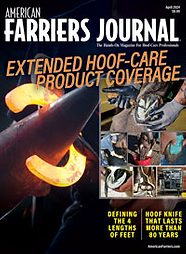Advertise Follow Us
Items Tagged with 'IRS'
ARTICLES
Know The Rules Before The Internal Revenue Service Knocks On Your Door
If you rent a shoeing rig to other farriers, are they employees, subcontractors or independent contractors?
Read More
The Hoof-Care Bottom Line
Don’t Overlook These Tax Deductions
Make sure you limit the taxes paid by determining the personal and business deductions you are allowed.
Read More
The Hoof-Care Bottom Line
How Much Did Shoeing That Horse Cost You?
You and the cost per horse: Performing a break-even analysis
Read More
The Hoof-Care Bottom Line
Profit Margin's Place in your Shoeing Business
Understanding this formula will help you see how much of what you charge for your work actually stays in your pocket
Read More
Honors For Legendary Scottish Farrier, Educational Opportunities, Highlight AFA’s Trip To Rochester
Organization?s 33rd annual convention draws over 1,000
Read More
Legal Notes For Shoers
Employee or Independent Contractor?
Make sure you know the differences when you arrange for on-the-job help.
Read More








